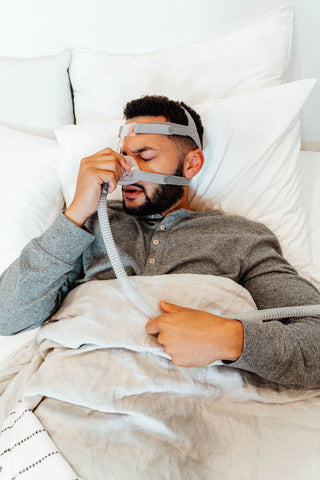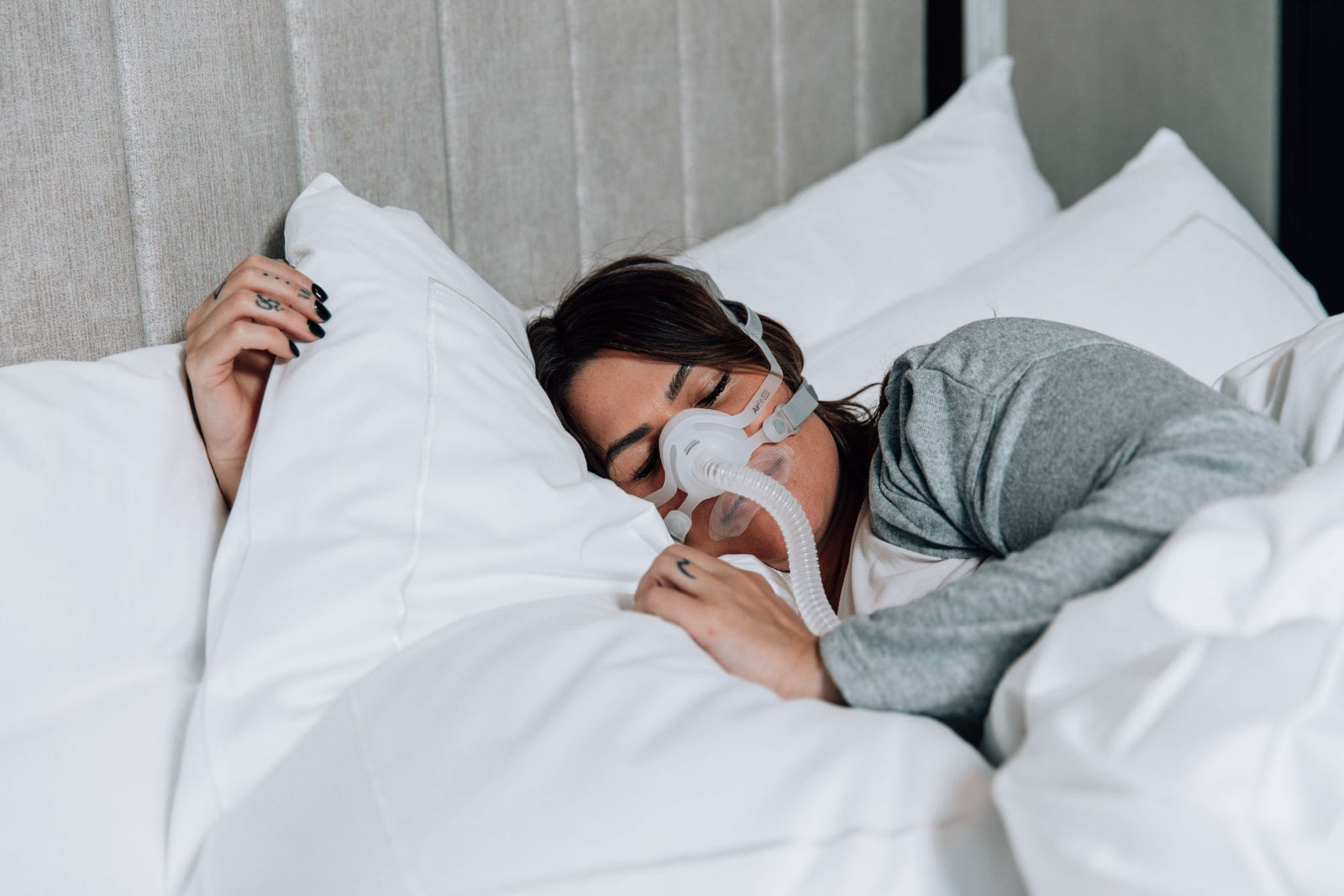It’s estimated that around 50 to 70 million adults in the United States have a sleep disorder, with sleep apnea being the most prevalent.
Whether you suspect that you have sleep apnea or you’ve already been diagnosed with it, chances are, you’re curious about how to treat it.
More importantly, you may be asking yourself, “can sleep apnea be cured?” Fortunately, we’ve found the answer, which is actually more complicated than you might think.
However, before we get into whether sleep apnea can be cured altogether, it’s important to understand the different types of sleep apnea.
Understanding the Types of Sleep Apnea
If you suspect you have sleep apnea, an overnight sleep study with a sleep specialist can confirm whether or not you suffer from the condition.
There are three main categories that each diagnosis falls under:
- Central sleep apnea (CSA)
- Obstructive sleep apnea (OSA)
- Mixed sleep apnea/Complex sleep apnea
All three are characterized by apneas, which are repeated lapses in breathing throughout the night.
Central sleep apnea is caused by a lapse in communication between the brain and the muscles responsible for controlling breath. With CSA, the brain temporarily fails to send appropriate signals to breathing muscles.
This type of sleep apnea is much less common than obstructive sleep apnea, which is caused by a mechanical malfunction of the airway.

OSA is characterized by a partial or full blockage of the airway as you sleep. This is caused by tissues that fall into the back of the throat and block airflow.
As a result, the blockage restricts blood flow to the brain, pauses breathing, and sends signals to the brain to wake up and breathe.
Mixed sleep apnea, also called complex sleep apnea, consists of symptoms from both obstructive and central sleep apnea symptoms. In fact, as many as 15% of people who have been diagnosed with OSA may actually have complex sleep apnea.
As you can imagine, any form of sleep apnea causes sleep deprivation and fragmentation.
Due to the disruption of sleep and quality of life sleep apnea causes, many people find themselves searching if sleep apnea can be cured or if it’s a lifelong condition.
The Bottom Line: Is There a Cure?
When we think of the term “cure,” we think of a condition coming to an end altogether, never to return. With each form of sleep apnea, this is usually not possible.
The bright side, though, is that proper treatment can greatly reduce mostsymptoms of sleep apnea.
It also depends on the type of sleep apnea you suffer from. Central sleep apnea is much trickier to treat, while obstructive sleep apnea has a higher chance of treatment success.

No matter the case, it’s imperative to seek treatment from a healthcare professional to properly manage sleep apnea and protect your health.
In fact, those with sleep apnea are more likely to suffer from the following complications, especially if left untreated:
- Cardiac arrest
- High blood pressure
- Heart disease
- Stroke
- Type 2 diabetes
- Weight gain
- Mental health issues
- Lowered immunity
- Memory loss
The appropriate treatments and healthy lifestyle changes are literally a matter of life and death, as untreated sleep apnea can cause premature death.
Treatment options are available across a broad scale, from non-invasive to invasive. For example, a change as minuscule as altering your sleep position may help protect your health.
Start Small With Your Sleep Position
While it may sound like a small and unimportant change, altering your sleep position can help reduce certain symptoms of sleep apnea and improve your sleep quality.
Research has proven that at least half of all patients with OSA may improve nightly symptoms by changing their sleeping position.
Sleeping on your back worsens symptoms since it causes tissues in the airway to fall backward while encouraging mouth breathing.
@somnifix Author of “Breath” #JamesNestor explains how the way you breath may cause #snoring and #sleepapnea 💤 #learnontiktok #sleep #airwayhealth #nasalbreathing #mouthbreathing via Take a Deep Breath on #YouTube
♬ TIME IN OBLIVION - iANO
In contrast, sleeping on your side can help your breathing return to a normal rate without obstructions.
Discuss your preferred sleeping position with your sleep specialist to see if switching up the way you position your body at night will benefit your specific case.
On the flip side, surgical options (although drastic) may also help to reduce symptoms caused by sleep apnea.
Surgical Options
Many upper airway surgeries have proven to be successful at improving sleep apnea. Usually, these surgeries are focused on removing or shrinking extra tissues around the upper airway.
This allows for easier breathing without obstructions, but this may only prove effective in patients with either OSA or complex sleep apnea.
These surgeries are performed by Ear Nose and Throat surgeons (ENTs) and are typically the most invasive treatment options available. As with any surgery, there are potential risks associated with going under the knife.
Most cases of sleep apnea may be managed with the addition of a Continuous Positive Airway Pressure (CPAP) machine, meaning that surgery is not necessary.
CPAP: The Most Common Treatment Form
CPAP treatment consists of wearing a pressurized mask over your nose and/or mouth as you sleep.
This treatment option is usually the first one recommended by most sleep specialists, as it uses continual pressure to push the airway back and keep it open throughout the night.

As a result, CPAP therapy allows patients to sleep comfortably without obstructions. However, not every person who is prescribed a CPAP machine is willing to stick with it for the long haul.
Some people find the masks to be cumbersome and uncomfortable, while others still experience mouth leaks despite wearing all of the proper equipment.
Mouth tape can help improve the effectiveness of CPAP therapy by keeping the lips sealed and free from mouth leaks.
Use SomniFix for Improved CPAP Therapy
CPAP therapy offers the most impactful treatment in your quest to uncover the burning question, “can sleep apnea be cured?” Nonetheless, there are some challenges associated with wearing a CPAP mask at night.
Pesky mouth leaks and uncomfortable equipment can make CPAP therapy feel like a drag. In spite of that, it’s one of the most commonly prescribed and most effective treatment options for reducing sleep apnea symptoms.
Mouth tape stops mouth leaks in their tracks, prevents snoring, and may even help you switch over to a more comfortable CPAP mask (such as a nasal pillow).
SomniFix Mouth Strips take the guesswork out of proper CPAP therapy by sealing the lips together, making mouth breathing virtually impossible.

Our strips are so comfortable you’ll forget they’re even there. The gel-like adhesive and hypoallergenic material make them a no-brainer for sleep apnea sufferers.
Sleep apnea shouldn’t go untreated, but treatment doesn’t have to be an uncomfortable hassle. Ask your sleep specialist about adding SomniFix to your sleep apnea treatment plan today!



